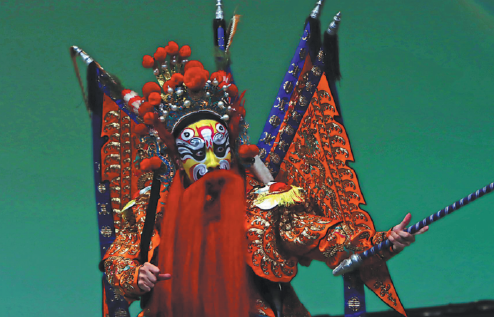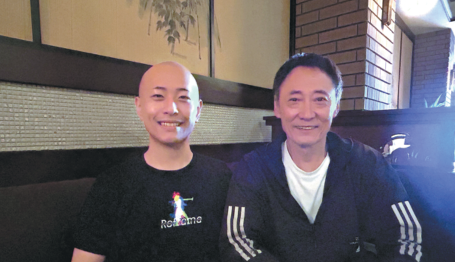Young Japanese holds deep affection for Peking Opera

Editor's note: China Daily presents the series Friends Afar to tell the stories of people-to-people exchanges between China and other countries. Through the vivid narration of the people in the stories, readers can get a better understanding of a country that is boosting openness.
Takanori Kobayashi, 23, has had a deep connection with Peking Opera that reaches back to his childhood. His fascination with Chinese history began early, as he was drawn to manga about Chinese tales, especially works like Romance of the Three Kingdoms and Water Margin by Japanese manga artist Mitsuteru Yokoyama. This passion for Chinese history and culture inspired him to look for related videos online.
When he was 14, he came across a video of the historical opera The Battle of Red Cliffs. Although he couldn't understand the language, he was captivated by the elaborate costumes, expressive makeup, and unique music of Peking Opera.
At 17, he discovered a website for the Shincyo Theater, a Tokyo-based Peking Opera troupe founded by Zhang Chunxiang, a Peking Opera artist born in Beijing and the third generation in his family dedicated to the art.
Zhang graduated from Beijing Vocational College of Opera and Arts, later joining the Jingju Theatre Company of Beijing, and moved to Japan in the 1980s. He went on to establish the Shincyo Theater and later founded the Japan Association for the Promotion of Peking Opera.
Kobayashi reached out to the theater via email, sharing with Zhang his childhood passion for Chinese historical manga, his admiration for the elaborate costumes and music of Peking Opera, and his desire to join the troupe.
Zhang remembered, "What impressed me most about Kobayashi was his maturity and composure, qualities that are quite rare for someone who is 17. His genuine interest in traditional Chinese culture and Peking Opera also intrigued me."
At the time, Kobayashi was living in Gunma Prefecture. At 18, he moved to Tokyo to attend Chuo University, where he majored in Chinese language and culture. "I chose to study Chinese language and culture in college specifically to learn Peking Opera," he said. He began attending Zhang's Peking Opera classes held every Saturday.
"I had no prior knowledge of Chinese," Kobayashi said, "so I started from scratch in college. When I began learning Peking Opera, my teacher guided me through the pronunciation, note by note. Gradually, I started to pick up some Chinese in this immersive environment."
Kobayashi is especially drawn to the singing style of laosheng, which represents dignified, upright male characters, typically middle-aged or older. He dreams of performing roles like Zhuge Liang, the brilliant statesman and military strategist of the Three Kingdoms period (220-280), or Yang Yanhui, a former Song Dynasty (960-1279) general who endures great hardships to visit his mother.
Notable pieces
To help his students, Zhang explains Peking Opera movements in simple Japanese. Kobayashi, who favors civil roles, prepares by listening to performances of notable pieces, such as Sitting in the Palace, a scene from Yang Silang Visits His Mother, performed by Yu Kuizhi, a leading Peking Opera artist. This listening practice gives him a sense of the piece, allowing him to pick up the lines more quickly, with Zhang's guidance refining his interpretation.
"Kobayashi studies singing laosheng roles. His calm demeanor is well-suited for these roles, and although his voice is somewhat low, it meets the requirements for laosheng. However, the troupe needed him to take on hualian, a painted-face role," Zhang said.
In 2020, Shincyo Theater staged plays such as Wild Boar Forest, where Kobayashi made his debut in a xiaohualian role, a small painted-face character. He also portrayed Liu Lihua, the innkeeper in At The Crossroads.
"To portray a hualian character, I shaved my head because the makeup requires either a bald head or closely trimmed hair. There are few Japanese as dedicated to Peking Opera as I am, and many Chinese people find it surprising, especially since there aren't many enthusiasts of Peking Opera among their own," said Kobayashi.
"I'm lucky to be surrounded by people with friendly feelings toward China, who are interested in Chinese culture and food," he said.
A fan of Chinese history, novels, and cuisine, Kobayashi is particularly fascinated by stories from the Spring and Autumn and Warring States periods. His study of Peking Opera has given him a deeper appreciation of China's historical legends.
After graduating this spring, he began working for a company specializing in pharmaceuticals and cosmetics, while in his spare time, he continues studying Peking Opera and occasionally performs in Shincyo Theater's public productions.
"Becoming a professional Peking Opera performer in Japan is difficult and might not be viable as a long-term career. In China, performers usually start training at four or five when their bodies are very flexible, whereas I began close to 20. For someone like me, it's more typical to treat Peking Opera as a passion rather than a career. Even so, I'd still like to pursue it professionally and give it my best shot," said Kobayashi.
He added, "I hope to study Peking Opera in China someday and bring what I learn back to Japan to help this art thrive here."
Kobayashi is also inspired by Yuta Ishiyama, a Japanese Peking Opera actor who trained at the Middle School Affiliated to the National Academy of Chinese Theatre Arts and became the first foreign performer at the China National Peking Opera Company. After returning to Japan, Ishiyama performed as the Monkey King in Shincyo Theater's 2024 production of Havoc in Dragon Palace.
Rising talent
"Each generation succeeds the previous," Zhang said. "Kobayashi is a promising rising talent among my students. Even though he is currently a corporate employee, he still aspires to master Peking Opera, which brings me great joy."
Kobayashi has visited Beijing twice — first as a tourist and later in 2023, when he accompanied Zhang on a family visit to purchase Peking Opera props. Zhang, originally from Beijing, took him to Tianqiao, a well-known artists' hub, which made a lasting impression on him.
On Sept 25 this year, the Union of Chinese Residing in Japan held a gala to mark the 75th anniversary of the founding of the People's Republic of China. Zhang led the Peking Opera segment, performing three acts with two other professionals and Kobayashi, who took on the martial role of Yu Hong, a main character in The Race of the Bamboo Grove.
Founded in 1996, Shincyo Theater initially showcased Zhang's performances alongside fellow Peking Opera actors and musicians. Realizing the need for actors to fill minor roles, Zhang then established a Peking Opera class.
Shincyo Theater delivers ticketed performances with audiences of around 300, of whom only 5-10 are Chinese, while the majority are Japanese, mostly women aged 50 to 70.To attract attendees, the troupe often chooses popular plays, such as Havoc in Dragon Palace, which features "monkey roles".
In 2015, Zhang founded the Japan Association for the Promotion of Peking Opera, which submits project proposals to Japan's Ministry of Education, Culture, Sports, Science and Technology to apply for opportunities to perform in Japanese elementary and middle schools, often with government sponsorship.
Before performances, Zhang teaches students basic roles of monkey or heavenly soldier, giving them a chance to experience Peking Opera. After they learn a set of moves, Zhang brings in the professional troupe to perform, including the students in the show. The students' involvement creates a special resonance.
"Promoting Peking Opera significantly enhances the Japanese people's understanding of China. After watching our performances, many express a wish to visit China, explore the birthplace of Peking Opera, and experience authentic performances," he added.
jiangxueqing@chinadaily.com.cn























